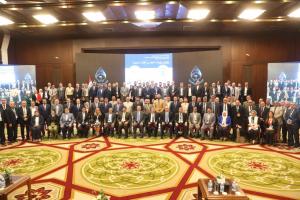
How can regional and international cooperation be fostered in a region that faces unprecedented water scarcity? How can the benefits of this vital resource be shared to increase resilience to climate change?
The Third Baghdad International Water Conference titled "Water Scarcity, the Mesopotamian Marshes, Shatt al-Arab Environment" (6-7 May 2023), organized by the Ministry of Water Resources of Iraq and the Authority of Dams and Water Resources, gathered country representatives and other concerned stakeholders from the region, together with UN entities, to address these pressing questions and challenges.
This comes in the wake of a long-lasting drought, and as desertification and the challenges of providing clean and safe water to Iraq's rising population threaten livelihoods and socio-economic development in the country and beyond.
The shared Euphrates and Tigris rivers are the most crucial surface water sources for 43.5 million Iraqis, as well as for Iran (88 million people), Syria (21 million people) and Türkiye (85 million people). However, in recent years, low precipitation and increasing temperatures have led to critically low water levels. As a downstream country, transboundary water cooperation with its riparian neighbours is therefore becoming increasingly important for Iraq and a matter of national and regional stability.
Iraq's accession to the UN Water Convention brings new opportunities for the country and the wider region
Against this background, the recent accession by Iraq to the Convention on the Protection and Use of Transboundary Watercourses and International Lakes (Water Convention) and its implications for Iraq and the region was an important subject of debate at the Conference. The international community highly praised Iraq as the first Party to Convention in the MENA region. The Conference also concluded with an invitation to other riparian countries in the Tigris and Euphrates river basins to join the two UN Water Conventions.
Ghulam Isaczai, Deputy Special Representative of the Secretary General and Resident Coordinator to Iraq, emphasized that "this accession will open new opportunities to enhance transboundary water cooperation while strengthening national water policies and practices and enhancing intersectoral cooperation and stakeholder participation".
The Water Convention's provisions for action at the national level can help strengthen the currently fragmented water governance in Iraq and support the development of a long-term, sustainable and fair cooperation framework based on UN standards and the rules of international law. The Convention also provides Iraq with an effective inter-sectoral vehicle to exchange experiences and assistance on many issues of relevance, such as adapting to and mitigating the impacts of climate change.
"Iraq has shown determination to harness the benefits of accession by establishing an Inter-Ministerial Committee on the Water Convention. The Committee can play a key role in guiding future action in the country, in line with the rules and principles of the Water Convention", said Francesca Bernardini, Chief of the Transboundary Cooperation Section at UNECE, which provides secretariat services to the Water Convention.
The benefits of Iraq's accession will be felt beyond Iraq. "Based on the experience of Water Convention Parties, I am convinced that Iraq's accession will not only be beneficial for the country but for the whole region. I hope other countries will follow Iraq's example and accede to the Water Convention. I encourage you to use the Convention to strengthen cooperation, development, and stability in the region. The Convention's community of Parties is available to support your efforts." said Harry Liiv, Chair of the Meeting of the Parties to the Water Convention and Special Envoy for Transboundary Waters of Estonia.
On 8 May, to build on the momentum, the Inter-Ministerial Committee on the Implementation of the Water Convention, under the chairmanship of H.E. Mr Aun Thiad, Minister of Water Resources of the Republic of Iraq, met with representatives of the Water Convention and of the UN Water Task Force in Iraq (UNDP, FAO, WHO, UNICEF, UNECE, UNESCWA and the Geneva Water Hub) to discuss next steps in the implementation of the Water Convention and coordinated support to Iraq's water action.

